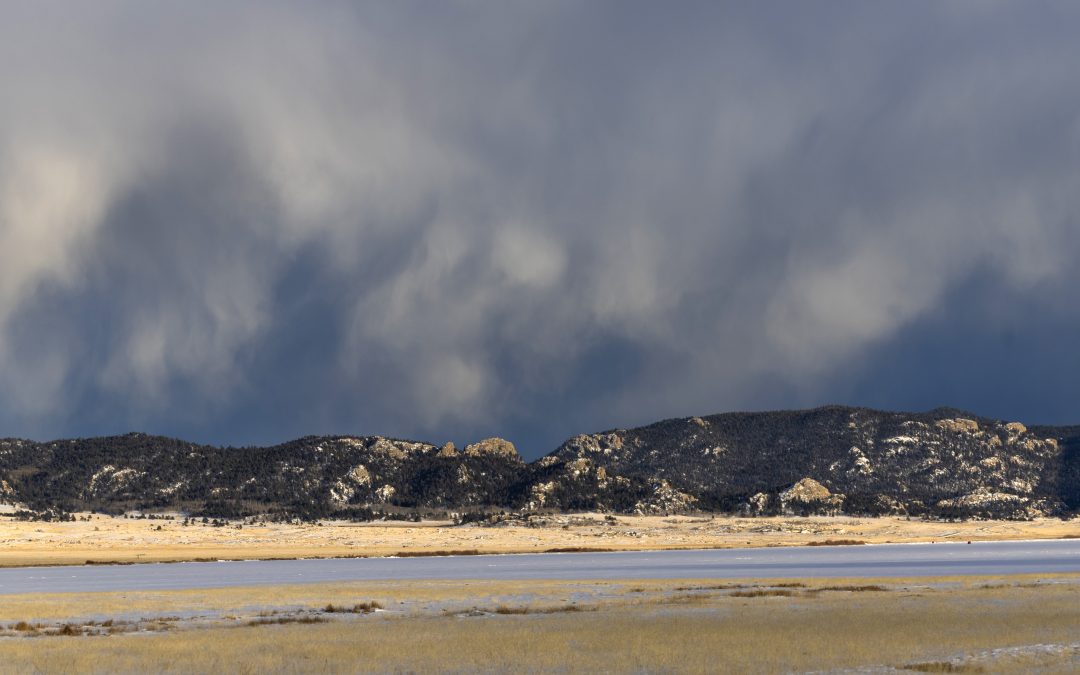Fast-growing Aurora plans to develop a new 200-acre site high in scenic Park County to build the largest reservoir in its system.
The $600 million-plus Wild Horse Reservoir project would store 93,000 acre-feet of water and be nearly twice the size of the city’s existing Park County storage pond, Spinney Mountain Reservoir, which holds 53,651 acre-feet of water. An acre-foot equals nearly 326,000 gallons of water, enough to serve at least two to four urban households for one year.
The proposed reservoir is among the latest moves by the city to secure future water supplies to meet growth-driven demand as streams and rivers shrink because of climate change.
Aurora, the third largest city in Colorado, is home to nearly 400,000 people and is expected to add some 300,000 more by 2070, according to the city’s website.
Pre-permitting discussions on the project have begun, according to Aurora Water spokesperson Greg Baker, and the process is expected to take at least two years. The reservoir is part of a larger water supply strategy that includes a recent $80.4 million purchase of farm water in the Arkansas River Valley, a deal that is drawing opposition from the Pueblo-based Southeastern Colorado Water Conservancy District.
Park County Commissioner Amy Mitchell declined to comment on the Wild Horse proposal, citing the county commission’s legal responsibility to review it under what’s known as a 1041 permit review, a process that gives the county the ability to approve or reject construction projects. That review could happen as early as next year, she said.
Like other cities, Aurora officials say they need to move quickly now to ensure residents and industry will have enough water in the future.
“Are we moving fast? If the opportunity is there, yes, we are taking it. Water will only become more difficult and expensive to obtain,” Baker said.
Other major new storage projects are being planned by cities along the Front Range, with Parker Water and Sanitation District hoping to build a 72,000 acre-foot reservoir in northeastern Colorado as part of a new municipal farm-water collaboration known as the Platte Valley Water Partnership.
The Aurora and Platte Valley projects are expected to be completed in roughly 10 to 15 years.
For Aurora, the Wild Horse project will provide more opportunities to store water it already owns in the Upper Colorado, the Arkansas and South Platte river basins, and to move that water around, Baker said.
The site lies south and east of Spinney Mountain Reservoir.
The city has a large-scale recycled water program known as Prairie Waters, which operates by claiming treated wastewater Aurora owns from the South Platte River on the Eastern Plains, filtering it through a series of gravel beds and then piping it back to Aurora’s water treatment facility where it is purified and mixed with fresh water and then delivered to residents and businesses.
But as the water is reused and becomes more concentrated, salinity levels rise, which means less water can be treated and reused. Wild Horse would allow more fresh water to be sent down the river, providing more “blend water” for Prairie Waters and expanding the amount of reused water Aurora Water can deliver to its customers, Baker said.
Water storage reservoirs have drawn fierce environmental opposition in the past 50 years, according to Ron Redd, manager of the Parker Water and Sanitation District.
In the past, water utilities would dam rivers, forever altering the ecosystem and harming water quality.
Parker and Aurora hope these new reservoirs will have fewer environmental impacts and won’t set off as many alarm bells because, in part, they won’t dam rivers or streams, Redd and Baker said. Instead, pipelines will be used to deliver water to the storage ponds.
The City of Greeley walked away from an expansion of its Milton Seaman Reservoir on the North Fork of the Cache La Poudre River in 2021, deciding instead to develop a groundwater and aquifer storage project beneath the Terry Bison Ranch, something the city believes will be easier to do and will give it more flexibility in managing its water supplies, according to Sean Chambers, director of Greeley’s Water and Sewer Department.
Gary Wockner, director of Save the World’s Rivers, has battled several reservoir storage projects in Colorado, including the expansion of Denver Water’s Gross Reservoir and the Northern Integrated Supply Project in northern Colorado, sometimes delaying them for years as court cases slogged through the legal system.
Wockner said, via email, that his organization is tracking Wild Horse but is waiting for more information to be filed during the permitting process before it decides whether to oppose the project.
“We are aware that Aurora claims that all of the water proposed to be stored in Wild Horse is already diverted. … Through the permitting process we will independently verify that claim. If Aurora is just moving already-diverted water around from one spot on the landscape to another, we likely won’t have an interest” in opposing it, Wockner said.



 Print
Print